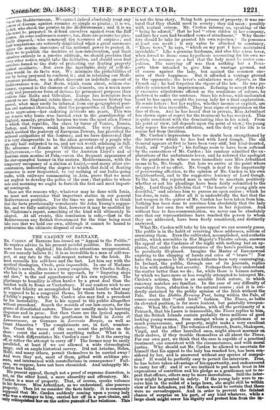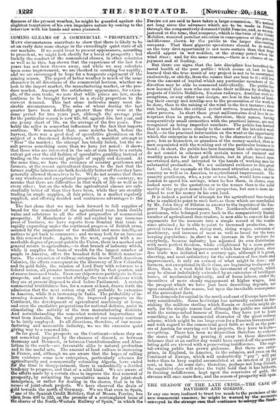THE CARDEN OF BARNANE.
Ma. CARDEN' of Barnane has issued an " Appeal to the Public." He requires advice in his present painful position. His amorous vows have been slighted; his delicate attentions unappreciated. He can scarcely believe it ; it is so incredible to a man of self-res- pect, at any rate to the self-respect natural to the Irish. He must reconcile his self-love and the fact. Let him say with the mystical theologian, Credo, quia impossibile. In one of Madame d'Arblay's novels, there is a young exquisite, Sir Charles Sedley, who has in a similar manner to approach, by " lingering steps and slow," to the sad apprehension of his own rejection. The pilgrimage to humility is often harder by a great deal than the barefoot walk to Rome or Canterbury. If our readers wish to see with what felicity an accomplished lady would handle what may be supposed to be a congenial theme, let them turn to Madame d'Arblay's pages ; where Mr. Carden also may find a precedent for his incredulity. Nor is his appeal to the public altogether without precedent. Search the records of our law-courts, for the groans of dissatisfied suitors. These are usually made in burning eloquence and in prose. But then there are the lyrical appeals. Who does not remember the gentleman in black in Lucia di Lammermoor, or Gennaro in Luerezia Borgia, as well as Count Almaviva ? The complainants are' in fact, number- less. Count the waves of the sea ; count the pebbles on the shore count the sand ; count anything rather. What is it, then, which differentiates Mr. Carden's case ? Is it the carrying off, or rather the attempt to carry off ? The former may be easily paralleled, at least if we are allowed a wide chronological ran e, and an ample historical survey. Did not Ariadne, Helen, Rend, and many others, permit themselves to be carried away ? And were they not, most of them, gifted with sublime pre- sents, and intermixed with constellations in consequence ? Fail- ures, we suppose, have not been chronicled. And unhappily Mr. Carden has failed. His present appeal, though not a proof of supreme discretion, is not, on the other hand, a mere absurdity and effrontery. Mr. Carden is a man of property. That, of course, speaks volumes In him favour. Miss Arbuthnot, as we understand, also posesses Property. Then let us consider the facts fairly. It is commonly int YPoeed that Mr. Carden suddenly coming upon a young lady W 0 was a stranger to him, carried her off, in a poet-chaise, and only relinquished her on the active puranitof her relations. This ii, not the true story. Being bothpersons of propertyi-it -wee na- tural that they should meet' in society ; they did meet possibly with mutual esteem. Mr. Carden informs us, 'speaking of-the " being he adored," that he had " often' ridden in her company, and into her ears had breathed vows of attachment." Why there...7 fore should he take for granted his own rejection' He possesses at least one merit ; if any value be attached to constancy. "-Those vows,?' he says, "which on my part I have maintained inviolable." Like a genuine Irishman, and also like a true lover, when forced to frame some hypothesis accounting for his own re- jection, he assumes as a fact that the lady must be under com- pulsion. His carrying off Was then nothing: but a Bona- parte blow intended to give him a vantage ground, not, of course against the lady, but against the, enamen ene- mies of their happiness. But it atarded a vantage g-roand. to the' opponents ; the lover's calculations were thfjoule, as the French say ; he had forgotten the rigour of the law. Ho was po- sitively sentenced to imprisonment. Refusing to accept the reale ly excessive stipulations offered as the conditions of release, he referred to suffer the sentence. Since his release, with undaunted, heart he has again sought tho young lady for a final expla,nation. He sends letters : but her replies, whether laconic or explicit, are, of course to him incredible. They bear signs of compulsion en the face of them. And he has heard that in private, Miss Arbuthnot has shown signs of regret for the treatment he has received, This is quite consistent with the dominating idea in his mind. From his point of view, (all depends upon the point of view,) the young lady repays his 'constant affection, and the duty of his life is to rescue her from-thraldom. Mr, 'Oarden's impressions have no doubt been strengthened by the interview which he has had with Lord Gough. The old, General appears at first to have been very stiff, but kind-hearted, , frank, and '" plucky " ; his feelings seem to have been softened kby the earnestness of Mr. Carden ; his candour admitted the ex- planations of the unfortunate lover, and he referred the apologist
to b
the eentlemen in whose more immediate care Miss Arbuthnot seems to be, Mr. Gough. But here we arrive at the point where the appeal is of no effect. Mr. Gough is deaf to the importunity of persevering affection, to the opinion of Mr. Carden in his own neighbourhood, and to the suggestive leniency of Lord Gough. To the last, the rejected man is unable to ascertain positively whether or not his pleadings have been fairly submitted to the lady. Lord Gough tells him that " the hearts of young girls are deceitful," and advises him to pursue an open course ; which he has done, in vain. After all it is undoubtedly the fact that the last weapon in the quiver of Mr. Carden has been taken from him. Nothing has been done to convince him absolutely that the lady herself of her own free will perseveres in her rejection. And without face to face communication, we never can be absolutely sure that our representations have reached the person to whom they are addressed, have been freely considered, and distinctly answered.
What Mr. Carden will take by his appeal we can scarcely guess. The public is in the habit of receiving these addresses, seldom of answering them. Even the cultivated, accomplished, and aesthetic public, which assembles in Her Majesty's Theatre saloon, answers the appeal of the Cardenio of the night with nothing but an ap- plause, that under the circumstances of the hero's position, must be peculiarly ill-placed. Imagine the Master of Ravenswood expiring to the clapping of hands and cries of " bravo "1. Nor have the responses to Mr. Carden hitherto been very encouraging. In Ireland, the public, through one of its journals, replies to him with nothing but severity. Perhaps there they understand the matter better than we do ; for, while there is human nature, by which we have more or less roughly attempted to interpret Mr. Carden's actions, there is an amiable Irish nature, to which runaway matches are familiar. In the case of any difficulty of courtship there, abduction is the natural course ; and it is evi- dently sustained by the public opinion of the Irish without the Pale. But the Dublin _Evening Post, being within the Pale, of course scouts that " ould Irish" fashion. The Times' as befits its elevated position, is far more lenient, but painfully irrespon- sive. When Mr. Carden complains, with all the pertinacity of a Petrareh, that his Laura is inaccessible, the Times replies to • .. that the British Islands contain probably three millions of looking young women, from amongst whom a gentleman of so much perseverance, and property, might make a very excellent choice. What an idea ! The volumes of Petrareh, Dante, Shakepere, Virgil, and the other laurelled ones, might almost murmur on their shelves, if they trouble themselves at all about the Times. For our own part, we think that the case is capable of a practical treatment, one consistent with the circumstances, and with moral justice. Why should not Mr. Carden be allowed to ascertain for himself that his appeal to the lady has reached her,. has been con- sidered by her, and is answered without any species of compul- sion It would be perfectly easy to permit the interview. he has before taken advantage of his opportunity, and endeavoured to carry. her off; and if we are inclined to put much trust in his expressions of contrition and his pledge as a gentleman not to re- peat that offence, others may be more incredulous. Still the inter- view might be granted in safety. If the young lady were to re- ceive him in the midst of a large lawn, she might still be within view of her defenders, yet Mr. Carden would be certain that there were no eavesdroppers. And in order to prevent the faintest chance of surprise on his part, of any kind whatever, while a large cloak might cover his dignity and protect him from the ia- akteilanes Of the -present- weather,-'he 'might he guarded, twain*. the slightest temptation._ofttis inneulmve nature by toithe .intenview with hie hands and arms pinioned.



























 Previous page
Previous page